Human Resource Management Report: Teamwork Effectiveness and Issues
VerifiedAdded on 2020/03/16
|9
|2168
|124
Report
AI Summary
This report analyzes the student's experience working in a team to assess human resource management practices at Imaginate Company. The report highlights the merits of teamwork, such as the division of responsibilities and diverse perspectives, but also identifies issues like cultural diversity, conflicts arising from differing opinions, and challenges in building consensus. The student, acting as team leader, implemented transformational leadership and feedback mechanisms to facilitate task accomplishment. The report also provides several recommendations for enhancing teamwork effectiveness, including careful team member selection based on task requirements, cultural compatibility, and sufficient time allocation for team building. The conclusion emphasizes the importance of addressing these factors for improved future teamwork outcomes.
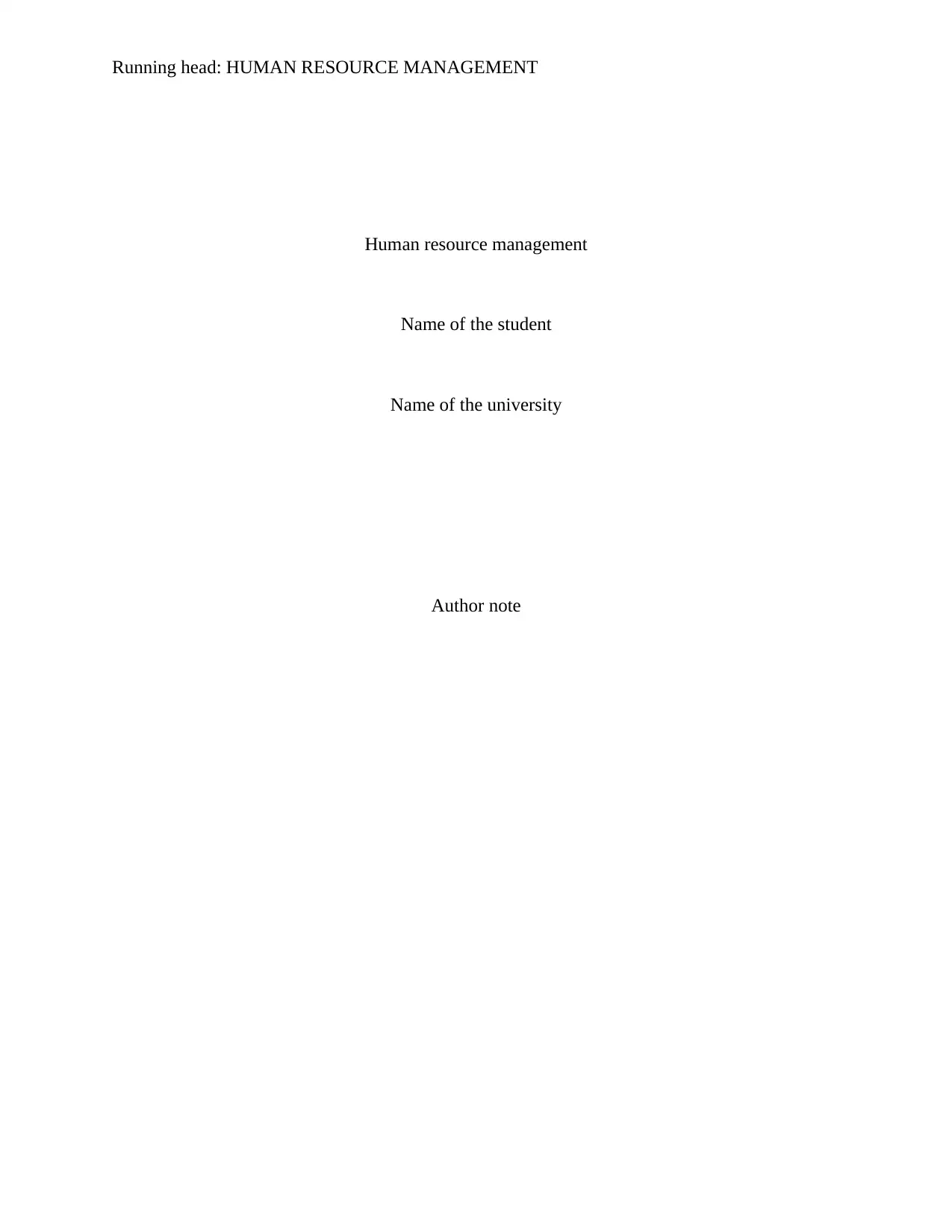
Running head: HUMAN RESOURCE MANAGEMENT
Human resource management
Name of the student
Name of the university
Author note
Human resource management
Name of the student
Name of the university
Author note
Paraphrase This Document
Need a fresh take? Get an instant paraphrase of this document with our AI Paraphraser
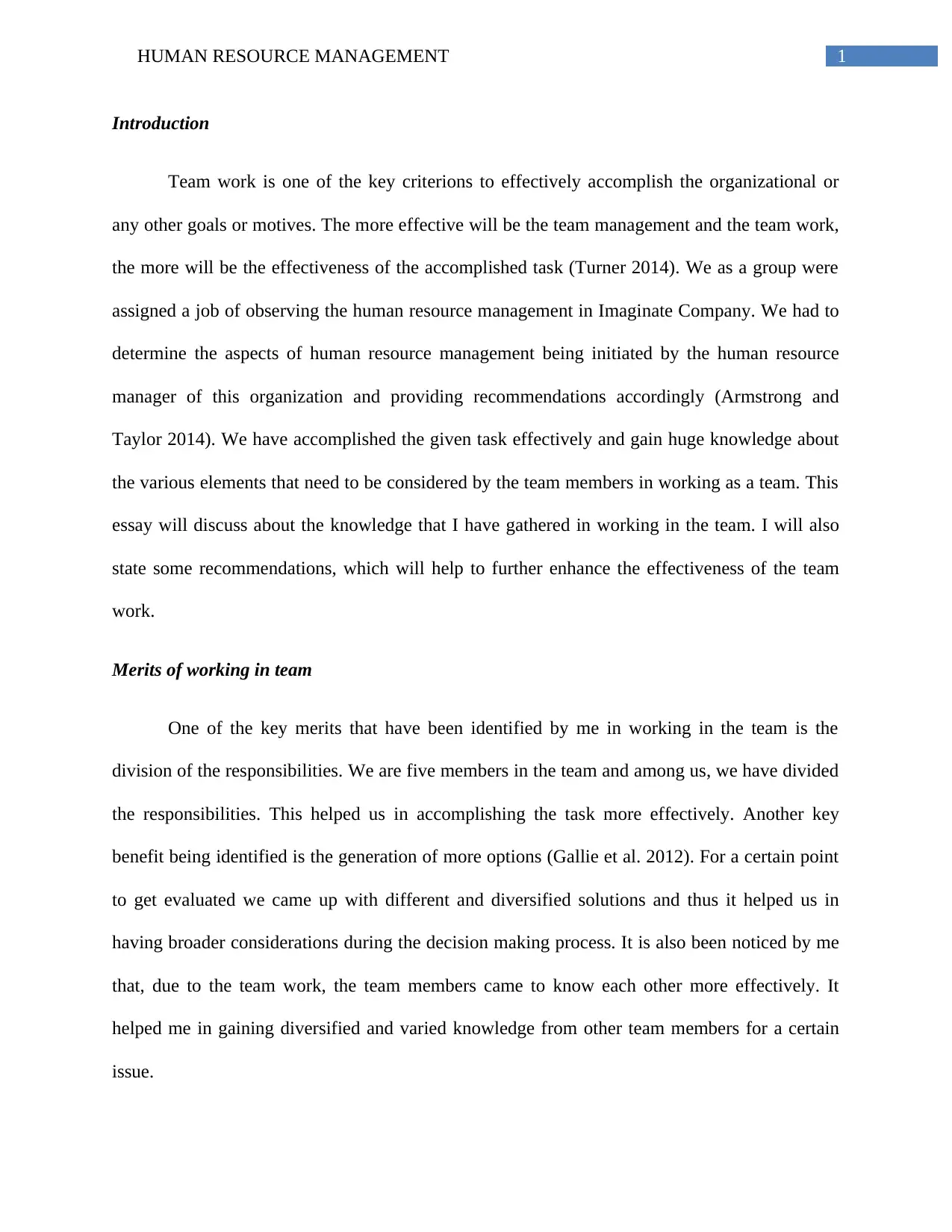
1HUMAN RESOURCE MANAGEMENT
Introduction
Team work is one of the key criterions to effectively accomplish the organizational or
any other goals or motives. The more effective will be the team management and the team work,
the more will be the effectiveness of the accomplished task (Turner 2014). We as a group were
assigned a job of observing the human resource management in Imaginate Company. We had to
determine the aspects of human resource management being initiated by the human resource
manager of this organization and providing recommendations accordingly (Armstrong and
Taylor 2014). We have accomplished the given task effectively and gain huge knowledge about
the various elements that need to be considered by the team members in working as a team. This
essay will discuss about the knowledge that I have gathered in working in the team. I will also
state some recommendations, which will help to further enhance the effectiveness of the team
work.
Merits of working in team
One of the key merits that have been identified by me in working in the team is the
division of the responsibilities. We are five members in the team and among us, we have divided
the responsibilities. This helped us in accomplishing the task more effectively. Another key
benefit being identified is the generation of more options (Gallie et al. 2012). For a certain point
to get evaluated we came up with different and diversified solutions and thus it helped us in
having broader considerations during the decision making process. It is also been noticed by me
that, due to the team work, the team members came to know each other more effectively. It
helped me in gaining diversified and varied knowledge from other team members for a certain
issue.
Introduction
Team work is one of the key criterions to effectively accomplish the organizational or
any other goals or motives. The more effective will be the team management and the team work,
the more will be the effectiveness of the accomplished task (Turner 2014). We as a group were
assigned a job of observing the human resource management in Imaginate Company. We had to
determine the aspects of human resource management being initiated by the human resource
manager of this organization and providing recommendations accordingly (Armstrong and
Taylor 2014). We have accomplished the given task effectively and gain huge knowledge about
the various elements that need to be considered by the team members in working as a team. This
essay will discuss about the knowledge that I have gathered in working in the team. I will also
state some recommendations, which will help to further enhance the effectiveness of the team
work.
Merits of working in team
One of the key merits that have been identified by me in working in the team is the
division of the responsibilities. We are five members in the team and among us, we have divided
the responsibilities. This helped us in accomplishing the task more effectively. Another key
benefit being identified is the generation of more options (Gallie et al. 2012). For a certain point
to get evaluated we came up with different and diversified solutions and thus it helped us in
having broader considerations during the decision making process. It is also been noticed by me
that, due to the team work, the team members came to know each other more effectively. It
helped me in gaining diversified and varied knowledge from other team members for a certain
issue.
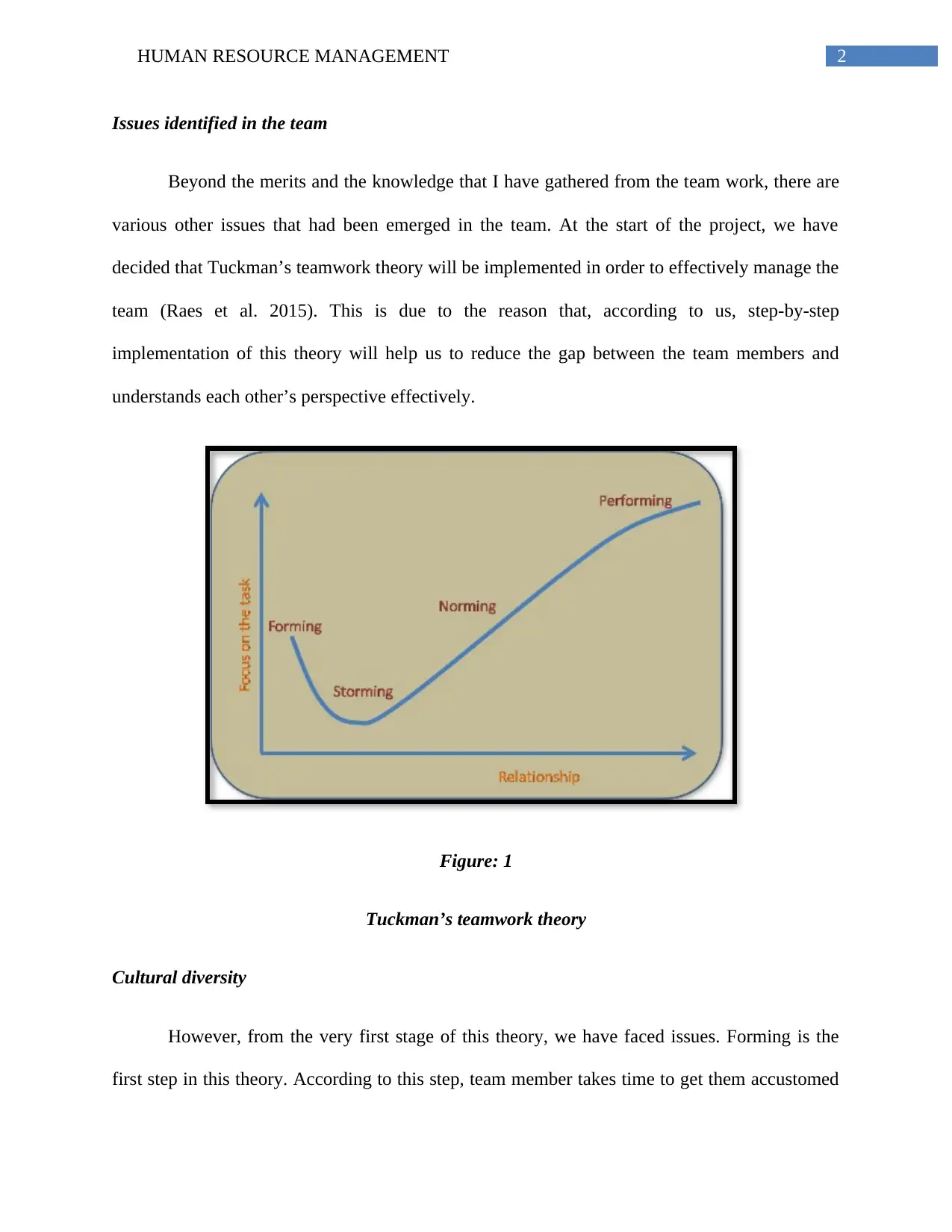
2HUMAN RESOURCE MANAGEMENT
Issues identified in the team
Beyond the merits and the knowledge that I have gathered from the team work, there are
various other issues that had been emerged in the team. At the start of the project, we have
decided that Tuckman’s teamwork theory will be implemented in order to effectively manage the
team (Raes et al. 2015). This is due to the reason that, according to us, step-by-step
implementation of this theory will help us to reduce the gap between the team members and
understands each other’s perspective effectively.
Figure: 1
Tuckman’s teamwork theory
Cultural diversity
However, from the very first stage of this theory, we have faced issues. Forming is the
first step in this theory. According to this step, team member takes time to get them accustomed
Issues identified in the team
Beyond the merits and the knowledge that I have gathered from the team work, there are
various other issues that had been emerged in the team. At the start of the project, we have
decided that Tuckman’s teamwork theory will be implemented in order to effectively manage the
team (Raes et al. 2015). This is due to the reason that, according to us, step-by-step
implementation of this theory will help us to reduce the gap between the team members and
understands each other’s perspective effectively.
Figure: 1
Tuckman’s teamwork theory
Cultural diversity
However, from the very first stage of this theory, we have faced issues. Forming is the
first step in this theory. According to this step, team member takes time to get them accustomed
⊘ This is a preview!⊘
Do you want full access?
Subscribe today to unlock all pages.

Trusted by 1+ million students worldwide
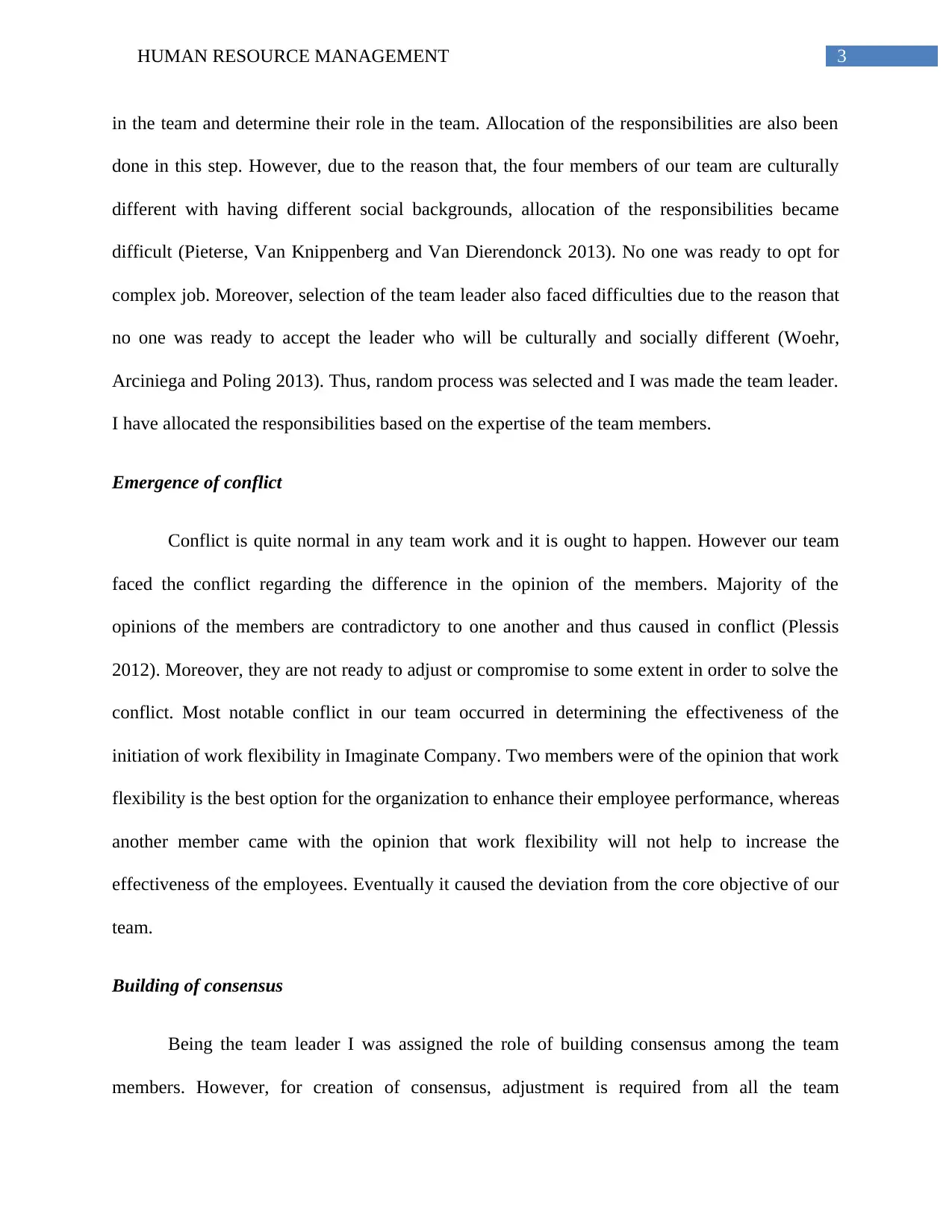
3HUMAN RESOURCE MANAGEMENT
in the team and determine their role in the team. Allocation of the responsibilities are also been
done in this step. However, due to the reason that, the four members of our team are culturally
different with having different social backgrounds, allocation of the responsibilities became
difficult (Pieterse, Van Knippenberg and Van Dierendonck 2013). No one was ready to opt for
complex job. Moreover, selection of the team leader also faced difficulties due to the reason that
no one was ready to accept the leader who will be culturally and socially different (Woehr,
Arciniega and Poling 2013). Thus, random process was selected and I was made the team leader.
I have allocated the responsibilities based on the expertise of the team members.
Emergence of conflict
Conflict is quite normal in any team work and it is ought to happen. However our team
faced the conflict regarding the difference in the opinion of the members. Majority of the
opinions of the members are contradictory to one another and thus caused in conflict (Plessis
2012). Moreover, they are not ready to adjust or compromise to some extent in order to solve the
conflict. Most notable conflict in our team occurred in determining the effectiveness of the
initiation of work flexibility in Imaginate Company. Two members were of the opinion that work
flexibility is the best option for the organization to enhance their employee performance, whereas
another member came with the opinion that work flexibility will not help to increase the
effectiveness of the employees. Eventually it caused the deviation from the core objective of our
team.
Building of consensus
Being the team leader I was assigned the role of building consensus among the team
members. However, for creation of consensus, adjustment is required from all the team
in the team and determine their role in the team. Allocation of the responsibilities are also been
done in this step. However, due to the reason that, the four members of our team are culturally
different with having different social backgrounds, allocation of the responsibilities became
difficult (Pieterse, Van Knippenberg and Van Dierendonck 2013). No one was ready to opt for
complex job. Moreover, selection of the team leader also faced difficulties due to the reason that
no one was ready to accept the leader who will be culturally and socially different (Woehr,
Arciniega and Poling 2013). Thus, random process was selected and I was made the team leader.
I have allocated the responsibilities based on the expertise of the team members.
Emergence of conflict
Conflict is quite normal in any team work and it is ought to happen. However our team
faced the conflict regarding the difference in the opinion of the members. Majority of the
opinions of the members are contradictory to one another and thus caused in conflict (Plessis
2012). Moreover, they are not ready to adjust or compromise to some extent in order to solve the
conflict. Most notable conflict in our team occurred in determining the effectiveness of the
initiation of work flexibility in Imaginate Company. Two members were of the opinion that work
flexibility is the best option for the organization to enhance their employee performance, whereas
another member came with the opinion that work flexibility will not help to increase the
effectiveness of the employees. Eventually it caused the deviation from the core objective of our
team.
Building of consensus
Being the team leader I was assigned the role of building consensus among the team
members. However, for creation of consensus, adjustment is required from all the team
Paraphrase This Document
Need a fresh take? Get an instant paraphrase of this document with our AI Paraphraser
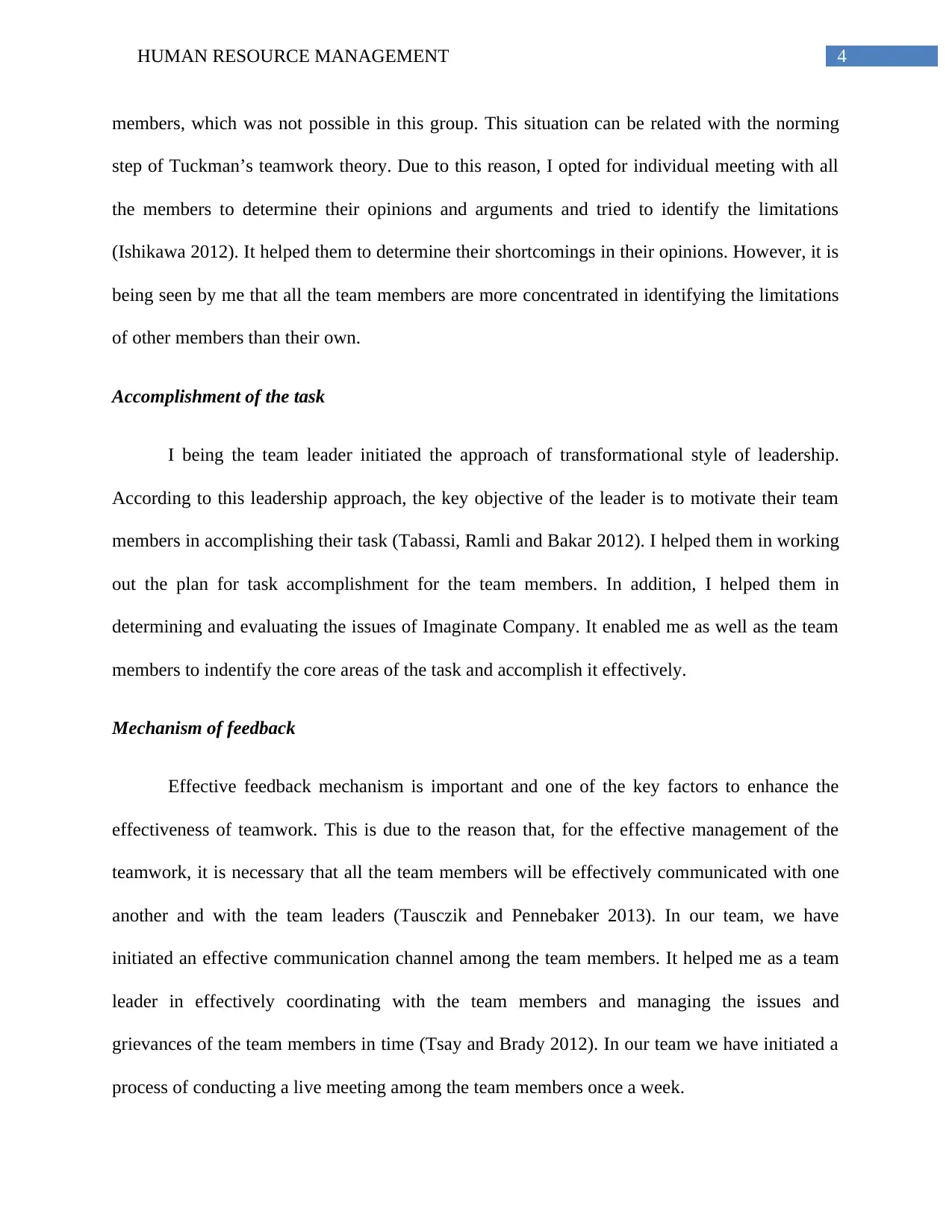
4HUMAN RESOURCE MANAGEMENT
members, which was not possible in this group. This situation can be related with the norming
step of Tuckman’s teamwork theory. Due to this reason, I opted for individual meeting with all
the members to determine their opinions and arguments and tried to identify the limitations
(Ishikawa 2012). It helped them to determine their shortcomings in their opinions. However, it is
being seen by me that all the team members are more concentrated in identifying the limitations
of other members than their own.
Accomplishment of the task
I being the team leader initiated the approach of transformational style of leadership.
According to this leadership approach, the key objective of the leader is to motivate their team
members in accomplishing their task (Tabassi, Ramli and Bakar 2012). I helped them in working
out the plan for task accomplishment for the team members. In addition, I helped them in
determining and evaluating the issues of Imaginate Company. It enabled me as well as the team
members to indentify the core areas of the task and accomplish it effectively.
Mechanism of feedback
Effective feedback mechanism is important and one of the key factors to enhance the
effectiveness of teamwork. This is due to the reason that, for the effective management of the
teamwork, it is necessary that all the team members will be effectively communicated with one
another and with the team leaders (Tausczik and Pennebaker 2013). In our team, we have
initiated an effective communication channel among the team members. It helped me as a team
leader in effectively coordinating with the team members and managing the issues and
grievances of the team members in time (Tsay and Brady 2012). In our team we have initiated a
process of conducting a live meeting among the team members once a week.
members, which was not possible in this group. This situation can be related with the norming
step of Tuckman’s teamwork theory. Due to this reason, I opted for individual meeting with all
the members to determine their opinions and arguments and tried to identify the limitations
(Ishikawa 2012). It helped them to determine their shortcomings in their opinions. However, it is
being seen by me that all the team members are more concentrated in identifying the limitations
of other members than their own.
Accomplishment of the task
I being the team leader initiated the approach of transformational style of leadership.
According to this leadership approach, the key objective of the leader is to motivate their team
members in accomplishing their task (Tabassi, Ramli and Bakar 2012). I helped them in working
out the plan for task accomplishment for the team members. In addition, I helped them in
determining and evaluating the issues of Imaginate Company. It enabled me as well as the team
members to indentify the core areas of the task and accomplish it effectively.
Mechanism of feedback
Effective feedback mechanism is important and one of the key factors to enhance the
effectiveness of teamwork. This is due to the reason that, for the effective management of the
teamwork, it is necessary that all the team members will be effectively communicated with one
another and with the team leaders (Tausczik and Pennebaker 2013). In our team, we have
initiated an effective communication channel among the team members. It helped me as a team
leader in effectively coordinating with the team members and managing the issues and
grievances of the team members in time (Tsay and Brady 2012). In our team we have initiated a
process of conducting a live meeting among the team members once a week.
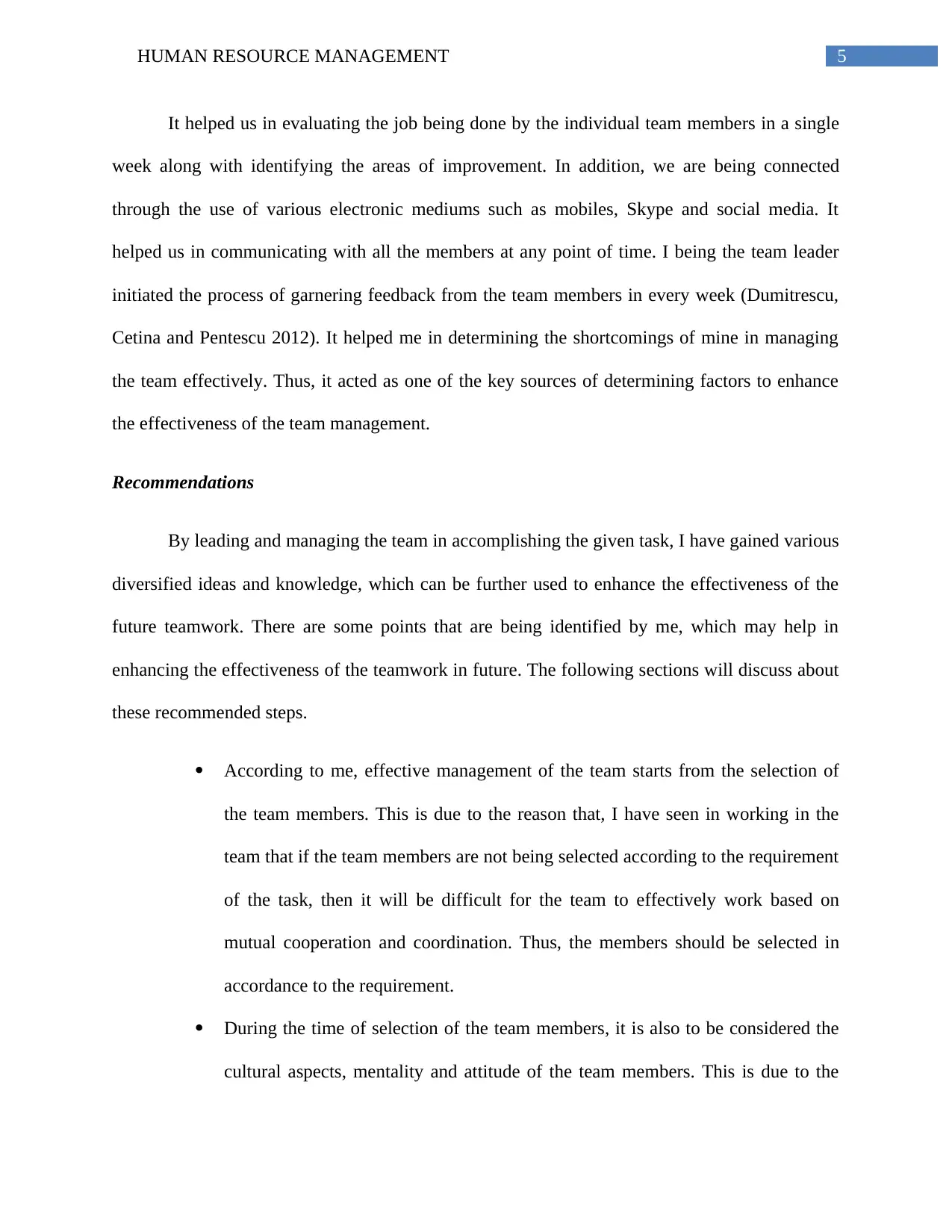
5HUMAN RESOURCE MANAGEMENT
It helped us in evaluating the job being done by the individual team members in a single
week along with identifying the areas of improvement. In addition, we are being connected
through the use of various electronic mediums such as mobiles, Skype and social media. It
helped us in communicating with all the members at any point of time. I being the team leader
initiated the process of garnering feedback from the team members in every week (Dumitrescu,
Cetina and Pentescu 2012). It helped me in determining the shortcomings of mine in managing
the team effectively. Thus, it acted as one of the key sources of determining factors to enhance
the effectiveness of the team management.
Recommendations
By leading and managing the team in accomplishing the given task, I have gained various
diversified ideas and knowledge, which can be further used to enhance the effectiveness of the
future teamwork. There are some points that are being identified by me, which may help in
enhancing the effectiveness of the teamwork in future. The following sections will discuss about
these recommended steps.
According to me, effective management of the team starts from the selection of
the team members. This is due to the reason that, I have seen in working in the
team that if the team members are not being selected according to the requirement
of the task, then it will be difficult for the team to effectively work based on
mutual cooperation and coordination. Thus, the members should be selected in
accordance to the requirement.
During the time of selection of the team members, it is also to be considered the
cultural aspects, mentality and attitude of the team members. This is due to the
It helped us in evaluating the job being done by the individual team members in a single
week along with identifying the areas of improvement. In addition, we are being connected
through the use of various electronic mediums such as mobiles, Skype and social media. It
helped us in communicating with all the members at any point of time. I being the team leader
initiated the process of garnering feedback from the team members in every week (Dumitrescu,
Cetina and Pentescu 2012). It helped me in determining the shortcomings of mine in managing
the team effectively. Thus, it acted as one of the key sources of determining factors to enhance
the effectiveness of the team management.
Recommendations
By leading and managing the team in accomplishing the given task, I have gained various
diversified ideas and knowledge, which can be further used to enhance the effectiveness of the
future teamwork. There are some points that are being identified by me, which may help in
enhancing the effectiveness of the teamwork in future. The following sections will discuss about
these recommended steps.
According to me, effective management of the team starts from the selection of
the team members. This is due to the reason that, I have seen in working in the
team that if the team members are not being selected according to the requirement
of the task, then it will be difficult for the team to effectively work based on
mutual cooperation and coordination. Thus, the members should be selected in
accordance to the requirement.
During the time of selection of the team members, it is also to be considered the
cultural aspects, mentality and attitude of the team members. This is due to the
⊘ This is a preview!⊘
Do you want full access?
Subscribe today to unlock all pages.

Trusted by 1+ million students worldwide
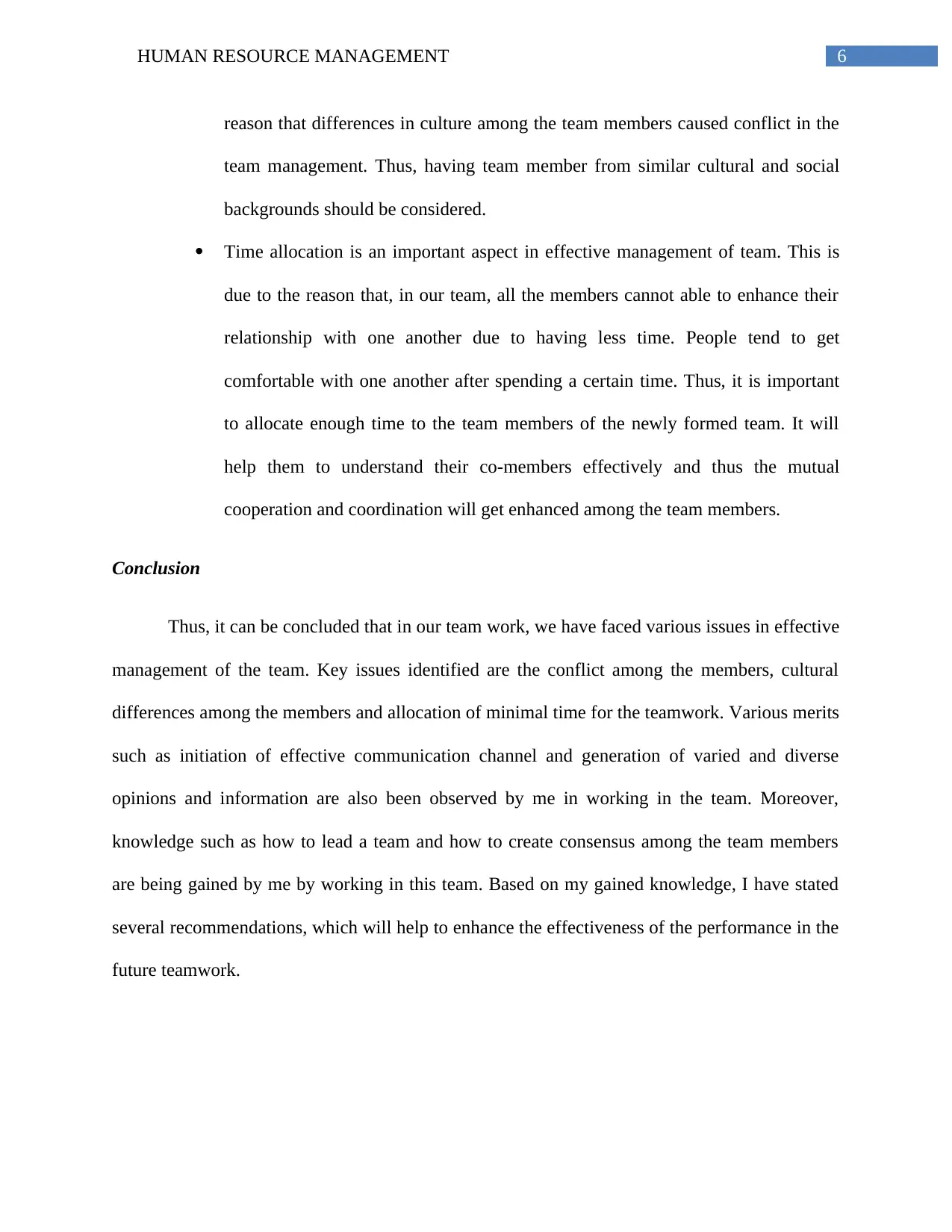
6HUMAN RESOURCE MANAGEMENT
reason that differences in culture among the team members caused conflict in the
team management. Thus, having team member from similar cultural and social
backgrounds should be considered.
Time allocation is an important aspect in effective management of team. This is
due to the reason that, in our team, all the members cannot able to enhance their
relationship with one another due to having less time. People tend to get
comfortable with one another after spending a certain time. Thus, it is important
to allocate enough time to the team members of the newly formed team. It will
help them to understand their co-members effectively and thus the mutual
cooperation and coordination will get enhanced among the team members.
Conclusion
Thus, it can be concluded that in our team work, we have faced various issues in effective
management of the team. Key issues identified are the conflict among the members, cultural
differences among the members and allocation of minimal time for the teamwork. Various merits
such as initiation of effective communication channel and generation of varied and diverse
opinions and information are also been observed by me in working in the team. Moreover,
knowledge such as how to lead a team and how to create consensus among the team members
are being gained by me by working in this team. Based on my gained knowledge, I have stated
several recommendations, which will help to enhance the effectiveness of the performance in the
future teamwork.
reason that differences in culture among the team members caused conflict in the
team management. Thus, having team member from similar cultural and social
backgrounds should be considered.
Time allocation is an important aspect in effective management of team. This is
due to the reason that, in our team, all the members cannot able to enhance their
relationship with one another due to having less time. People tend to get
comfortable with one another after spending a certain time. Thus, it is important
to allocate enough time to the team members of the newly formed team. It will
help them to understand their co-members effectively and thus the mutual
cooperation and coordination will get enhanced among the team members.
Conclusion
Thus, it can be concluded that in our team work, we have faced various issues in effective
management of the team. Key issues identified are the conflict among the members, cultural
differences among the members and allocation of minimal time for the teamwork. Various merits
such as initiation of effective communication channel and generation of varied and diverse
opinions and information are also been observed by me in working in the team. Moreover,
knowledge such as how to lead a team and how to create consensus among the team members
are being gained by me by working in this team. Based on my gained knowledge, I have stated
several recommendations, which will help to enhance the effectiveness of the performance in the
future teamwork.
Paraphrase This Document
Need a fresh take? Get an instant paraphrase of this document with our AI Paraphraser
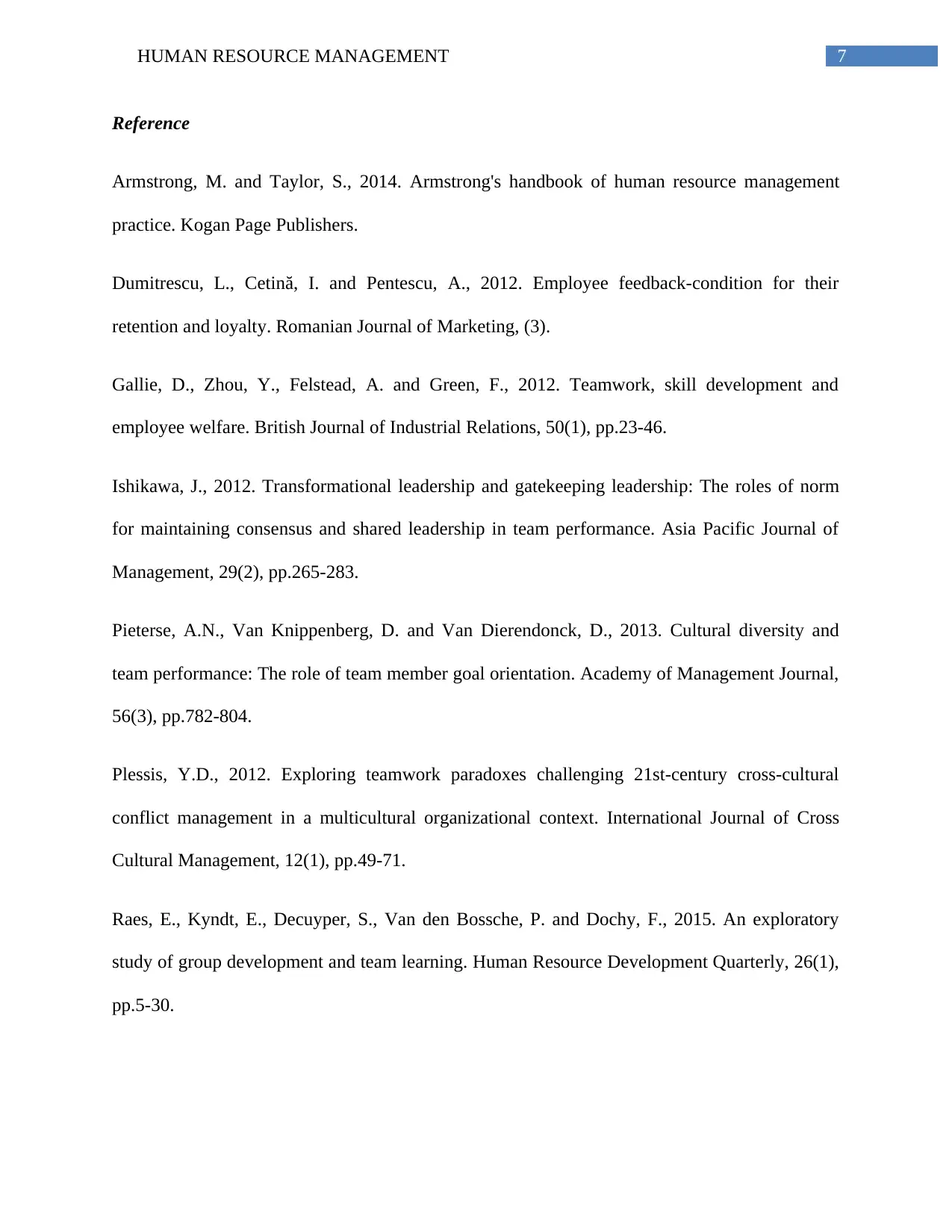
7HUMAN RESOURCE MANAGEMENT
Reference
Armstrong, M. and Taylor, S., 2014. Armstrong's handbook of human resource management
practice. Kogan Page Publishers.
Dumitrescu, L., Cetină, I. and Pentescu, A., 2012. Employee feedback-condition for their
retention and loyalty. Romanian Journal of Marketing, (3).
Gallie, D., Zhou, Y., Felstead, A. and Green, F., 2012. Teamwork, skill development and
employee welfare. British Journal of Industrial Relations, 50(1), pp.23-46.
Ishikawa, J., 2012. Transformational leadership and gatekeeping leadership: The roles of norm
for maintaining consensus and shared leadership in team performance. Asia Pacific Journal of
Management, 29(2), pp.265-283.
Pieterse, A.N., Van Knippenberg, D. and Van Dierendonck, D., 2013. Cultural diversity and
team performance: The role of team member goal orientation. Academy of Management Journal,
56(3), pp.782-804.
Plessis, Y.D., 2012. Exploring teamwork paradoxes challenging 21st-century cross-cultural
conflict management in a multicultural organizational context. International Journal of Cross
Cultural Management, 12(1), pp.49-71.
Raes, E., Kyndt, E., Decuyper, S., Van den Bossche, P. and Dochy, F., 2015. An exploratory
study of group development and team learning. Human Resource Development Quarterly, 26(1),
pp.5-30.
Reference
Armstrong, M. and Taylor, S., 2014. Armstrong's handbook of human resource management
practice. Kogan Page Publishers.
Dumitrescu, L., Cetină, I. and Pentescu, A., 2012. Employee feedback-condition for their
retention and loyalty. Romanian Journal of Marketing, (3).
Gallie, D., Zhou, Y., Felstead, A. and Green, F., 2012. Teamwork, skill development and
employee welfare. British Journal of Industrial Relations, 50(1), pp.23-46.
Ishikawa, J., 2012. Transformational leadership and gatekeeping leadership: The roles of norm
for maintaining consensus and shared leadership in team performance. Asia Pacific Journal of
Management, 29(2), pp.265-283.
Pieterse, A.N., Van Knippenberg, D. and Van Dierendonck, D., 2013. Cultural diversity and
team performance: The role of team member goal orientation. Academy of Management Journal,
56(3), pp.782-804.
Plessis, Y.D., 2012. Exploring teamwork paradoxes challenging 21st-century cross-cultural
conflict management in a multicultural organizational context. International Journal of Cross
Cultural Management, 12(1), pp.49-71.
Raes, E., Kyndt, E., Decuyper, S., Van den Bossche, P. and Dochy, F., 2015. An exploratory
study of group development and team learning. Human Resource Development Quarterly, 26(1),
pp.5-30.
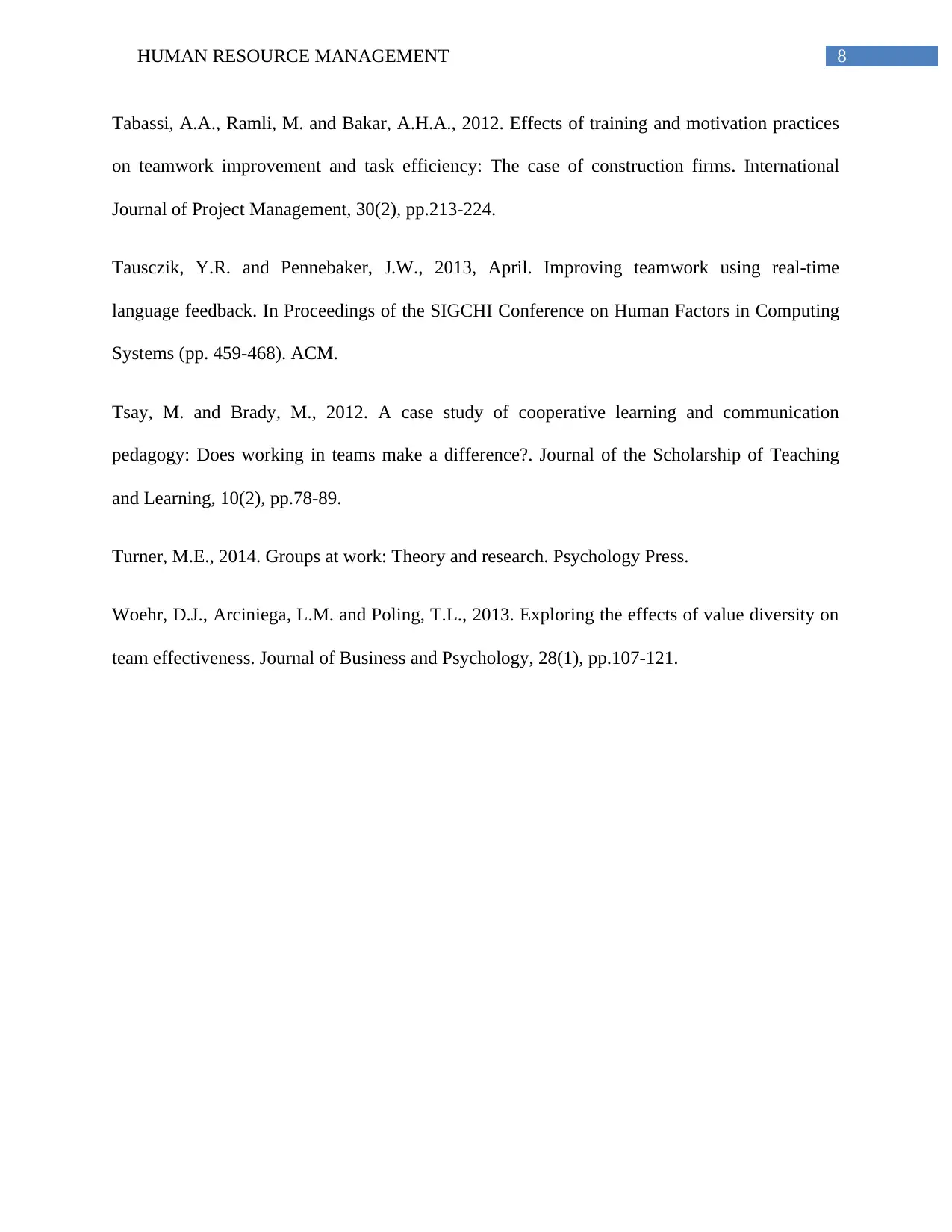
8HUMAN RESOURCE MANAGEMENT
Tabassi, A.A., Ramli, M. and Bakar, A.H.A., 2012. Effects of training and motivation practices
on teamwork improvement and task efficiency: The case of construction firms. International
Journal of Project Management, 30(2), pp.213-224.
Tausczik, Y.R. and Pennebaker, J.W., 2013, April. Improving teamwork using real-time
language feedback. In Proceedings of the SIGCHI Conference on Human Factors in Computing
Systems (pp. 459-468). ACM.
Tsay, M. and Brady, M., 2012. A case study of cooperative learning and communication
pedagogy: Does working in teams make a difference?. Journal of the Scholarship of Teaching
and Learning, 10(2), pp.78-89.
Turner, M.E., 2014. Groups at work: Theory and research. Psychology Press.
Woehr, D.J., Arciniega, L.M. and Poling, T.L., 2013. Exploring the effects of value diversity on
team effectiveness. Journal of Business and Psychology, 28(1), pp.107-121.
Tabassi, A.A., Ramli, M. and Bakar, A.H.A., 2012. Effects of training and motivation practices
on teamwork improvement and task efficiency: The case of construction firms. International
Journal of Project Management, 30(2), pp.213-224.
Tausczik, Y.R. and Pennebaker, J.W., 2013, April. Improving teamwork using real-time
language feedback. In Proceedings of the SIGCHI Conference on Human Factors in Computing
Systems (pp. 459-468). ACM.
Tsay, M. and Brady, M., 2012. A case study of cooperative learning and communication
pedagogy: Does working in teams make a difference?. Journal of the Scholarship of Teaching
and Learning, 10(2), pp.78-89.
Turner, M.E., 2014. Groups at work: Theory and research. Psychology Press.
Woehr, D.J., Arciniega, L.M. and Poling, T.L., 2013. Exploring the effects of value diversity on
team effectiveness. Journal of Business and Psychology, 28(1), pp.107-121.
⊘ This is a preview!⊘
Do you want full access?
Subscribe today to unlock all pages.

Trusted by 1+ million students worldwide
1 out of 9
Related Documents
Your All-in-One AI-Powered Toolkit for Academic Success.
+13062052269
info@desklib.com
Available 24*7 on WhatsApp / Email
![[object Object]](/_next/static/media/star-bottom.7253800d.svg)
Unlock your academic potential
Copyright © 2020–2026 A2Z Services. All Rights Reserved. Developed and managed by ZUCOL.




